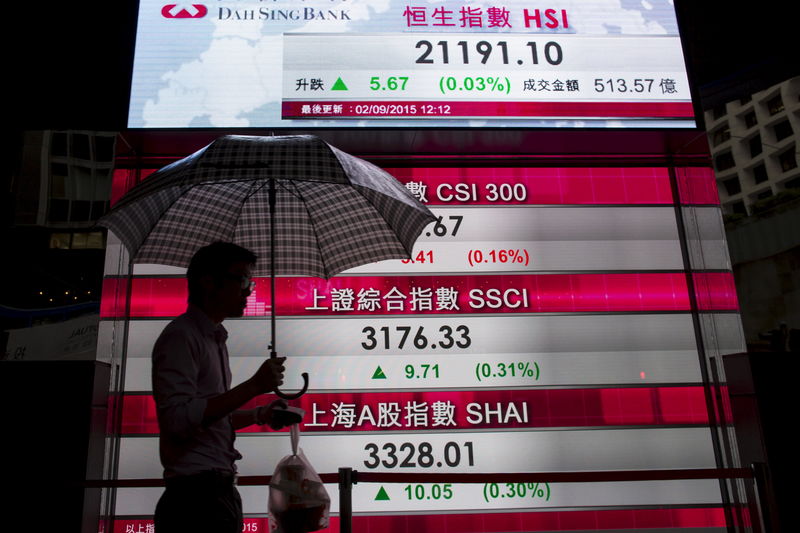Asian stocks dip as U.S. inflation looms, Alibaba leads tech losses
2023.09.11 00:33

© Reuters.
Investing.com– Most Asian stocks edged lower on Monday as markets remained risk-averse before more cues on U.S. inflation and interest rates, while Alibaba logged steep losses after its cloud unit boss unexpectedly quit.
Hong Kong’s index was by far the worst performer among its peers, down 1.6% as heavyweight technology stocks slumped. Alibaba Group (HK:) (NYSE:) was the biggest decliner of the lot, losing more than 3% after the e-commerce giant said its outgoing CEO Daniel Zhang will also quit as CEO and chairman of its cloud unit.
Media reports over the weekend also said that Alibaba was considering putting a hold on plans to list its Freshippo grocery chain, due to a weaker-than-expected valuation outlook.
Hong Kong stocks played catch-up with their regional peers, following a trading suspension on Friday due to adverse weather conditions.
Japan’s fell 0.2%, while the was flat as Bank of Japan Governor Kazuo Ueda said that the bank could potentially consider a pivot away from negative interest rates, ending the decades of monetary support enjoyed by local stocks.
Ueda told a local newspaper that the BOJ will have enough data by the end of the year to determine whether rates need to remain negative.
Australia’s was flat, taking some support from optimism over China, while futures for India’s index pointed to a slightly negative open. South Korea’s rose 0.2%, buoyed by a recovery in local tech stocks from recent losses.
A spike in , in anticipation of key due later this week, still pressured most Asian technology stocks. Regional stocks were also reeling from a potential escalation in a U.S.-China trade war, as Beijing barred government officials from using Apple Inc’s (NASDAQ:) iPhone.
Chinese shares rise as inflation improves
Chinese shares were the outliers among their peers on Monday, as data released over the weekend showed some improvement in the country’s deflationary trend. The and indexes rose 0.2% and 0.4%, respectively, as data released on Saturday showed rose in August after a decline in the prior month.
But remained in contraction, albeit at a slower pace than the prior month.
The improved inflation data was accompanied by more stimulus measures from the Chinese government, particularly a further loosening in property market restrictions.
But Chinese stocks were still trading largely negative for the year, hit by growing concerns over an economic slowdown in the country. While recent data showed some signs of improvement, China’s manufacturing sector still remained under pressure from slowing demand, while service sector activity was also cooling.







